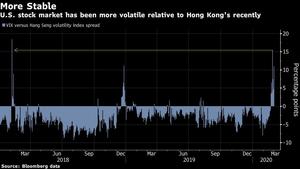
Hong Kong’s highly liquid stock market is not usually associated with stability during a global rout, but that’s the status it’s acquired amid expectations Chinese stimulus will support valuations.
READ MORE: Hong Kong stocks haven't been this hot since protests began
While US stocks have lurched more than 3% in four of its past seven sessions, the Hang Seng Index has displayed relative calmness -- 2% moves remain rare. Equity traders aren’t rushing to hedge against further swings either: an index of expected volatility has remained below its US counterpart for seven consecutive days, the longest stretch since late 2018. The VHSI Index is also about 6 percentage points lower than Europe’s VStoxx volatility gauge.
If we have a global easing environment, foreign investors would come to Hong Kong
Louis Tse, managing director at VC Asset Management Ltd
It’s not that the virus doesn’t present a challenge to Hong Kong. The city’s economy, already reeling from months of violent protests stemming from the extradition bill incident last year, is facing a likely second annual contraction in 2020 as tourism evaporates and retailers close. But such worries are already baked into share prices -- Hong Kong stocks are near the lowest level in 16 years relative to global equities.
With little profit left to take, traders are focused instead on the prospect that Beijing will roll out significant fiscal stimulus to support the economy. The performance of Chinese mainland financial markets provides further reason for courage: the Shanghai Composite Index completed its best three-day gain in 11 months, while the yuan is poised for its best day in more than a year.
Hong Kong’s US$5.3 trillion stock market has historically been a beneficiary of global easing, due to its lack of foreign investment controls and capital gains taxes, as well as its ties to US monetary policy thanks to a currency peg to the greenback. With inflows set to rise, and valuations cheap, Hong Kong’s battered equities may look increasingly appealing.
“If we have a global easing environment, foreign investors would come to Hong Kong,” said Louis Tse, managing director at VC Asset Management Ltd. “We are talking about 10 times price-to-earnings here, which is a good entry point.”
ALSO READ: Short sellers' raid on HK means small caps go extra cheap
Flows from the mainland have already turned stronger, with traders having snapped up HK$61 billion (US$7.9 billion) of the city’s shares last month, the most since January 2018, according to data compiled by Bloomberg. Hong Kong’s shares have recently lagged those in the mainland by the most in more than three years.
“Chinese A shares are driven by domestic liquidity, while the Hong Kong market is driven by both domestic and global funds. So aggressive rates cuts by global central banks would be helpful for Hong Kong stocks in the near term,” said Michael Liang, chief investment officer at Foundation Asset Management (HK) Ltd.


